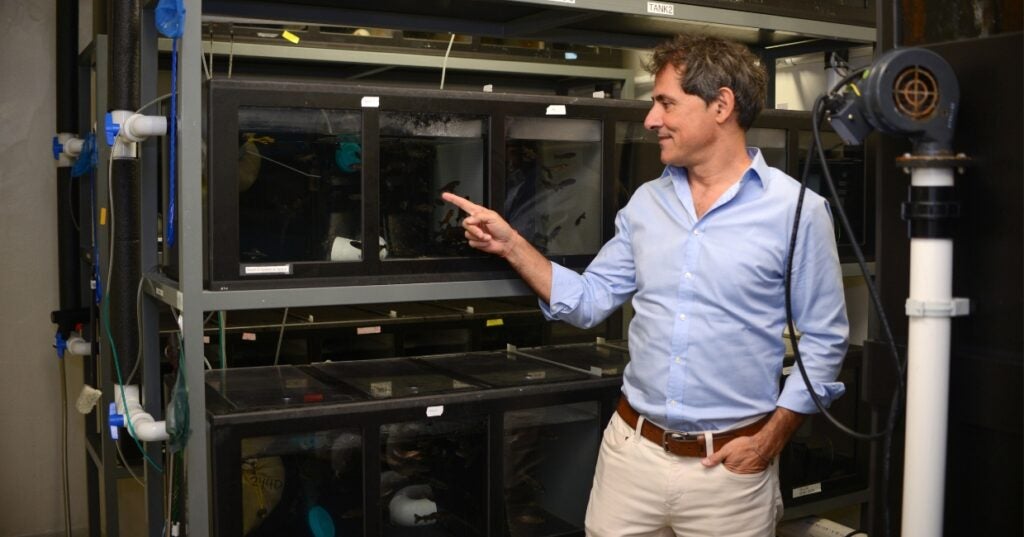Penn Vet Announces mRNA Research Initiative to Advance Veterinary Vaccine Science

Faculty In This Story
The University of Pennsylvania (Penn) School of Veterinary Medicine (Penn Vet) announced the launch of the School’s mRNA Research Initiative to fast-track the development of veterinary mRNA-based vaccines and host-directed therapies.
Phillip Scott, PhD, vice dean for Research and Academic Resources announced the Initiative on the 35th anniversary of the American Association for the Advancement of Science’s National Public Science Day. The research initiative will be led by Christopher Hunter, PhD, founding director of Penn Vet’s Institute for Infectious and Zoonotic Diseases (IIZD) and the Mindy Halikman Heyer Distinguished Professor of Pathobiology.
“The mRNA Research Initiative will advance basic vaccine science leveraging the mRNA platform and harness our extraordinary expertise here at Penn Vet,” said Scott. “Not only will this Initiative make a substantial contribution to mRNA scholarship, but it will also facilitate the application of the mRNA platform to the development of veterinary vaccines.”
Funding for the Initiative was provided by the Penn Institute for RNA Innovation through the backing of 2023 Nobel Prize winner Drew Weissman, MD, PhD, the Roberts Family Professor of Vaccine Research in Penn’s Perelman School of Medicine.
“This support is designed to foster ongoing collaborations between Penn’s Perelman School of Medicine and Penn Vet,” said Weissman. “Expanding the breadth of work on mRNA biology across species.”
Operating under the umbrella of Penn Vet’s IIZD, and with support from the Commonwealth of Pennsylvania, the Initiative will advance basic vaccine science using the mRNA platform, develop mRNA vaccines that target veterinary species, and accelerate innovation at Penn Vet using mRNA-based vaccines and therapies for a variety of diseases.
While mRNA vaccines are efficient at stimulating antibody responses, they are less able to generate enduring lung, gut, and skin T cells that are critical for barrier immunity to many pathogens. Leveraging Penn Vet’s immunologic expertise, the first phase of the project will investigate how to generate sustained T cell-mediated immunity in the lung, gut, and skin with mRNA vaccines. Scientific findings from these basic studies will inform the project’s goal to develop veterinary vaccines, including a vaccine for avian influenza in poultry, and a vaccine for viral infections in swine.
“The development of mRNA vaccine approaches has had a tremendous impact on human health, but it has not yet been applied to the veterinary vaccine field,” said Hunter. “The flexible nature of mRNA technology makes it a tractable platform to generate and validate species-specific mRNA expressing immune modulators and to design vaccines for a whole host of veterinary pathogens. This Initiative will have a profound role in protecting not only the health and welfare of farm animals and our food supply, but also on the safety and long-term viability of farming communities in Pennsylvania and across the country.”
In addition to basic and translational vaccine projects, the Initiative will fund at least one multi-investigator research project annually that expands the scope, furthers progress, or leverages existing scholarship to accelerate mRNA research at Penn Vet. An annual symposium will also be held, providing a forum for scientists, scholars, and students to present their work utilizing the mRNA platform; and to contribute to the overall advancement of Penn Vet’s mRNA science.
Learn more about Penn’s mRNA technology and its future applications here.
Related News

Behind the Breakthroughs: J. Oriol Sunyer
J. Oriol Sunyer explores how studying the evolution of the immune system reveals surprising connections between fish and human immunity, and what these discoveries could mean for the development of…

Penn Vet’s Institute for Infectious and Zoonotic Diseases Hosts Second Annual Research Retreat
The University of Pennsylvania (Penn) School of Veterinary Medicine’s (Penn Vet) Institute for Infectious and Zoonotic Diseases (IIZD) hosted its annual Faculty Research Retreat on September 3 at the Brandywine…

A New Study from Penn Vet Reveals an Unsung Immune Defender as a Key Guardian of Gut Health and Metabolism
A pioneering new study published in Nature Microbiology, led by Oriol Sunyer, PhD, and a team of researchers at Penn Vet and the University of New Mexico, have uncovered a…
About Penn Vet
Ranked among the top ten veterinary schools worldwide, the University of Pennsylvania School of Veterinary Medicine (Penn Vet) is a global leader in veterinary education, research, and clinical care. Founded in 1884, Penn Vet is the first veterinary school developed in association with a medical school. The school is a proud member of the One Health initiative, linking human, animal, and environmental health.
Penn Vet serves a diverse population of animals at its two campuses, which include extensive diagnostic and research laboratories. Ryan Hospital in Philadelphia provides care for dogs, cats, and other domestic/companion animals, handling more than 30,000 patient visits a year. New Bolton Center, Penn Vet’s large-animal hospital on nearly 700 acres in rural Kennett Square, PA, cares for horses and livestock/farm animals. The hospital handles more than 6,300 patient visits a year, while our Field Services have gone out on more than 5,500 farm service calls, treating some 22,400 patients at local farms. In addition, New Bolton Center’s campus includes a swine center, working dairy, and poultry unit that provide valuable research for the agriculture industry.


